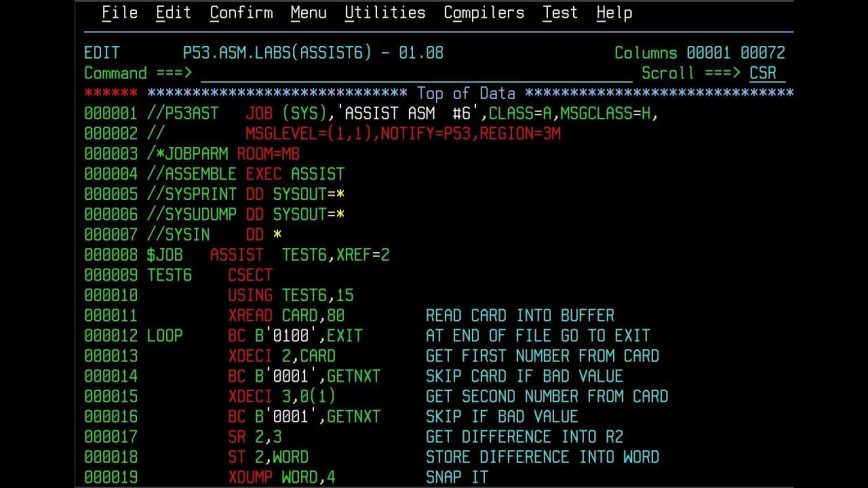What is an assembler – An assembler is a software tool used in computer programming to convert assembly language code into machine code, which can be understood and executed by a computer’s central processing unit (CPU). It is an essential component in the software development process, specifically for programming in low-level languages.
Introduction
In the world of computer programming, various tools and software are utilized to create and execute applications efficiently. One such tool is an assembler, which plays a vital role in translating assembly language code into machine code. This article explores the concept of an assembler, its purpose, functioning, types, benefits, and its significance in programming.
Definition of an Assembler
An assembler can be defined as a program that takes assembly language instructions as input and converts them into machine code. Assembly language is a low-level programming language that uses mnemonic instructions to represent operations and memory locations. The assembler facilitates the translation process, ensuring that the instructions are converted into the appropriate binary representations.
Purpose of an Assembler
The primary purpose of an assembler is to bridge the gap between human-readable assembly language and machine-readable binary code. It allows programmers to write code in a more human-friendly format while enabling the computer to execute the instructions accurately and efficiently. Assemblers help in simplifying the programming process and make it easier to understand and debug code.
How Assemblers Work
Assemblers work by analyzing the assembly language code line by line. They identify the instructions, registers, and memory addresses specified by the programmer and translate them into their corresponding binary representations. The assembler also resolves any symbolic addresses and calculates the memory locations for labels and variables.
Types of Assemblers
There are different types of assemblers available, each catering to specific programming requirements. One type is the one-pass assembler, which reads the assembly code once and translates it into machine code in a single pass. Another type is the multi-pass assembler, which makes multiple passes through the code, allowing for more complex features like forward references and macros.
Benefits of Using an Assembler
Using an assembler provides several benefits to programmers. Firstly, it offers a higher level of control over the hardware and allows direct access to system resources. Additionally, assemblers enable optimization at a low level, resulting in faster and more efficient code execution. They also offer greater flexibility compared to higher-level languages, making them suitable for programming in resource-constrained environments.
Examples of Popular Assemblers
Several popular assemblers are widely used in the programming community. One such assembler is NASM (Netwide Assembler), which is compatible with different operating systems and supports various CPU architectures. Another widely-used assembler is GAS (GNU Assembler), which is part of the GNU Compiler Collection (GCC) and is known for its portability and flexibility.
Assembler vs Compiler
While assemblers and compilers are both essential in the process of converting code, there are notable differences between them. An assembler translates assembly language code directly into machine code, whereas a compiler converts high-level programming languages like C, C++, or Java into machine code. Assemblers work at a lower level of abstraction, dealing with specific hardware instructions, registers, and memory locations, while compilers handle a broader range of programming concepts.
Common Assembler Instructions
Assemblers support a variety of instructions that enable programmers to perform operations at the hardware level. These instructions include moving data between registers and memory, performing arithmetic and logical operations, branching and looping, and interacting with input/output devices. Understanding and utilizing these instructions efficiently is crucial for writing effective assembly language code.
Importance of Assemblers in Programming
Assemblers hold significant importance in programming, particularly in scenarios where low-level control and optimization are required. They are commonly used in embedded systems programming, device driver development, operating system development, and other performance-critical applications. Assemblers provide programmers with direct access to hardware resources, allowing for fine-grained control over system operations.
Challenges and Limitations of Assemblers
While assemblers offer advantages in terms of control and optimization, they also come with challenges and limitations. Writing code in assembly language can be complex and time-consuming, requiring a deep understanding of hardware architectures. Additionally, code portability becomes an issue as different hardware platforms may have different assembly languages. Furthermore, debugging assembly code can be more challenging compared to higher-level languages.
Conclusion
In conclusion, an assembler is a vital tool in computer programming that translates assembly language code into machine code. It bridges the gap between human-readable instructions and the binary representations that computers understand. Assemblers provide programmers with control, optimization, and flexibility in low-level programming. While they have their challenges and limitations, their importance in certain domains of programming cannot be overlooked.
FAQs
FAQ 1: Can assemblers be used for high-level programming languages?
No, assemblers are specific to low-level programming languages like assembly language. High-level programming languages are typically compiled or interpreted by different tools.
FAQ 2: Is it necessary to learn assembly language to become a programmer?
While learning assembly language can enhance your understanding of computer architecture and low-level programming, it is not a requirement for all programmers. Many programming tasks can be accomplished using high-level languages.
FAQ 3: Are assemblers platform-specific?
Yes, different hardware platforms may have different assembly languages, making assemblers platform-specific. However, some assemblers, like NASM and GAS, support multiple platforms.
FAQ 4: Are assemblers still relevant in modern programming?
Yes, assemblers are still relevant in specific domains where low-level control, optimization, and performance are crucial, such as embedded systems and operating system development.
FAQ 5: Are there any high-level languages that directly generate assembly code?
Yes, some high-level languages provide options to generate assembly code directly, allowing programmers to have more control over the generated machine code. However, this is not common practice in most programming scenarios.
com Domain Registration | Buy a .com Domain Name Today
Search The Domain Name You Want com Domain Registration – The internet has become an
Best Ransomware Detection Techniques
22 May 2023What is Drupal used for?
22 May 2023Is PrestaShop a CMS or Framework?
22 May 2023






